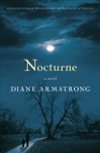Review:

 Fourth Estate, 2008
Fourth Estate, 2008
ISBN 9780732284305
(Ages 14+) There is no doubt that Diane Armstrong has the ability to capture and hold the reader engrossed, as she relates her story of courage and cruelty set in one of the most horrendous periods of our history. The overall quality and design of this paperback, with good sized print, makes reading this 560 page book fairly easy. Readable with a clear continuity of plot and setting, Armstrong brings us a story which remains embedded in our memories.
Nocturne is based on historical events which took place during and immediately after the Second World War. Part 1 takes the reader from the start of war in Poland to the end of the Warsaw Ghetto uprising, with the heroine Elzunia emerging safely, after losing most of her family and so many of her friends to the Nazi onslaught. She has met Adam, a young Polish pilot, at the beginning of the war - indeed he rescues her in an ambush - and it is this memory which drives her ambition to make it through to the end of the war. In Part 2, Adam, now a valuable member of the Resistance, goes to London to petition for help, meeting words of acknowledgement and empathy, but not action on the part of the Allies. In the final section of the novel the two characters meet after months of hardship and adversity.
Armstrong is the author of two powerfully written non-fiction works and a novel, Winter Journey, each based on Polish history and heritage.
She brings to Nocturne, a wealth of meticulous research, part of her family's background and stories of real players in this country's past.
There is a strong sense of political feeling running through the novel - Armstrong believes that all nations denied the Jews in Poland their freedom, closing their eyes to the unfolding disaster. She explores this issue, revealing to her readers the courage and independence of a people determined to fight for freedom. The world of the Ghetto is real, and we become emotionally involved in the lives of its inhabitants. The human qualities of loyalty, bravery, sacrifice and endurance emerge as the people face insurmountable odds.
At times the language is clumsy and overly wordy - it may be that Armstrong is better placed as a writer of memoir, for she frequently includes historical details in the narrative which seems contrived; however, the strong sense of place and authenticity of subject excuse her from this weakness.
Here too is a valuable addition to the field of reads for 'connected texts' work in Years 11 and 12.
Julie Wells
Home
Nocturne by Diane Armstrong

 Fourth Estate, 2008
Fourth Estate, 2008ISBN 9780732284305
(Ages 14+) There is no doubt that Diane Armstrong has the ability to capture and hold the reader engrossed, as she relates her story of courage and cruelty set in one of the most horrendous periods of our history. The overall quality and design of this paperback, with good sized print, makes reading this 560 page book fairly easy. Readable with a clear continuity of plot and setting, Armstrong brings us a story which remains embedded in our memories.
Nocturne is based on historical events which took place during and immediately after the Second World War. Part 1 takes the reader from the start of war in Poland to the end of the Warsaw Ghetto uprising, with the heroine Elzunia emerging safely, after losing most of her family and so many of her friends to the Nazi onslaught. She has met Adam, a young Polish pilot, at the beginning of the war - indeed he rescues her in an ambush - and it is this memory which drives her ambition to make it through to the end of the war. In Part 2, Adam, now a valuable member of the Resistance, goes to London to petition for help, meeting words of acknowledgement and empathy, but not action on the part of the Allies. In the final section of the novel the two characters meet after months of hardship and adversity.
Armstrong is the author of two powerfully written non-fiction works and a novel, Winter Journey, each based on Polish history and heritage.
She brings to Nocturne, a wealth of meticulous research, part of her family's background and stories of real players in this country's past.
There is a strong sense of political feeling running through the novel - Armstrong believes that all nations denied the Jews in Poland their freedom, closing their eyes to the unfolding disaster. She explores this issue, revealing to her readers the courage and independence of a people determined to fight for freedom. The world of the Ghetto is real, and we become emotionally involved in the lives of its inhabitants. The human qualities of loyalty, bravery, sacrifice and endurance emerge as the people face insurmountable odds.
At times the language is clumsy and overly wordy - it may be that Armstrong is better placed as a writer of memoir, for she frequently includes historical details in the narrative which seems contrived; however, the strong sense of place and authenticity of subject excuse her from this weakness.
Here too is a valuable addition to the field of reads for 'connected texts' work in Years 11 and 12.
Julie Wells
Home
© Pledger
Consulting, 2007